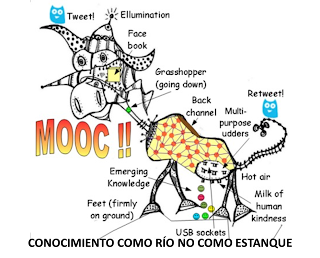viernes, 25 de noviembre de 2011
lunes, 21 de noviembre de 2011
martes, 15 de noviembre de 2011
viernes, 11 de noviembre de 2011
MOOC
In the field of open education, one of the latest trends is that of open courses, called MOOCs (Massively Open Online Courses). Such courses are founded on the theory of connectivism and an open pedagogy based on networked learning. Typically, participation in a MOOC is free; however, some MOOCs may charge a fee in the form of tuition if the participant seeks some form of accreditation. Although the courses generally do not have specific requirements all MOOCs provide rough timelines in the form of weekly topics to focus discussion. The rest of the structure can be minimal – often consisting of a weekly presentation on the current topic, discussion questions, and suggested resources. In recognition that those attending a MOOC are expected to make the course their own, guidance tends to focus on allowing curriculum and structure to emerge from the exchange between participants. Posting in discussions, reflecting on topical ideas, and sharing resources using a variety of social media are at the core of the MOOC learning process.
A Massive open online course (MOOC) is a course where the participants are distributed and course materials also are dispersed across the web. This is possible only if the course is open, and works significantly better if the course is large. The course is not a gathering, but rather a way of connecting distributed instructors and learners across a common topic or field of discourse. MOOCs are a more recent form of online course development, departing from formats that rely on posted resources, Learning Management Systems, and structures that mix the LMS with more open web resources.
Suscribirse a:
Comentarios (Atom)

